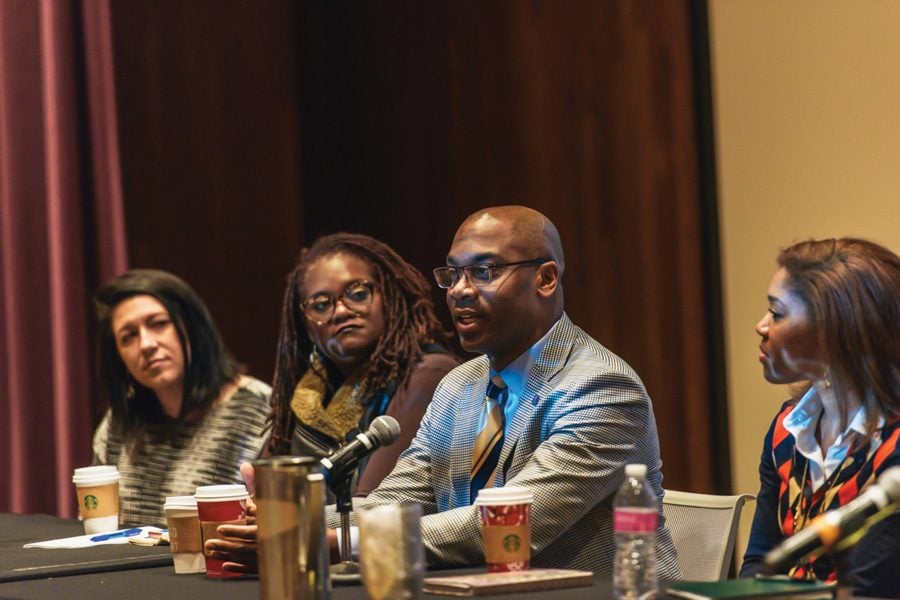Panelists discuss current state of Black Lives Matter movement
Noah Frick-Alofs/The Daily Northwestern
Four professors discuss the current state of the Black Lives Matter movement on a seven-person panel. The discussion was held Wednesday night as part of two weeks of student-run Northwestern Dialogue programming.
January 12, 2017
The National Panhellenic Council and Northwestern’s chapter of the National Association of Black Journalists organized a moderated discussion Wednesday night to discuss the state of the Black Lives Matter movement.
The event featured a panel of seven professors from NU and Loyola University Chicago and was attended by about 50 students and faculty. The discussion was part of two weeks of student-organized and administration-backed programming surrounding the movement.
Northwestern African American Studies Prof. Debra Thompson described the Black Lives Matter movement as a test of American democracy, saying it challenges the sacrifices constantly expected of black people throughout the country’s history.
“At what point does it become not only undemocratic, but unethical, to ask the people who are the most exploited, the most vulnerable and most subjugated in this society to be the ones who have to continuously sacrifice?” she asked. “At what point does our democracy demand too much of us?”
The panelists also drew lines of comparison between the civil rights movement and Black Lives Matter.
Loyola University history Prof. John Donoghue described the latter’s less hierarchical organization as a potential strength, but Medill Prof. Deborah Douglas said it is dangerous to divide the two movements. She said the movements are inherently connected because Black Lives Matter activists and those who participated in the civil rights movement have similar goals.
“(Comparing the two) challenges the ability for the old guard with the new guard to come together and combine their strengths to say something really powerful and effective, which is something we’re really going to need to do if we’re going to try to control this narrative of Black Lives Matter,” she said.
The panelists also debated how not having one designated leader for Black Lives Matter can both help and hurt the cause. For Douglas, decentralized leadership is worrisome, as she said it leads to confusion and decentralized goals.
However, Thompson said not having explicitly visible leadership is a strength of the movement and makes it less vulnerable to government intervention.
“That’s something that is quite powerful: the ability to evade surveillance, the ability to evade the mechanisms of the state that are designed to discipline black bodies, black behaviors in order to conform to what’s the norm of society,” she said.
Thompson discussed her faith in students who build up a large part of the movement, which is largely organized at the grassroots level. Students and future generations can fuel the future, she said.
“While I question the university as an institution’s ability to be an agent of social transformation, I don’t question the students’ ability,” she said. “If there is hope, it is with you.”
As a student currently taking a course on Black Lives Matter, SESP sophomore Ashley Woods said she appreciated the professors’ honesty. The event helped her realize the importance of student participation in such discussions, she said.
“It’s just important for me to engage in these kind of activities,” she said. “This movement is for us and by us. It’s to say that we acknowledge that there is problem.”
Email: [email protected]
Twitter: @ck_525


